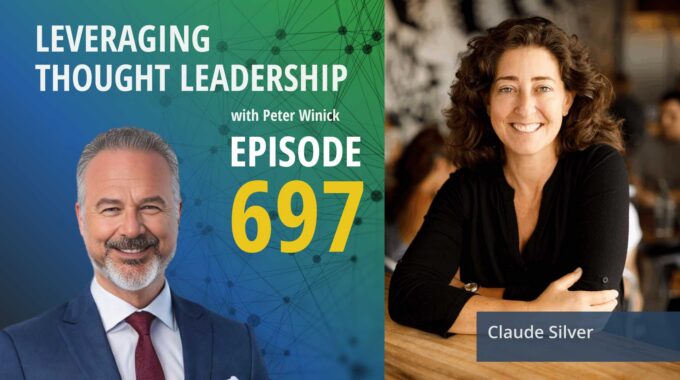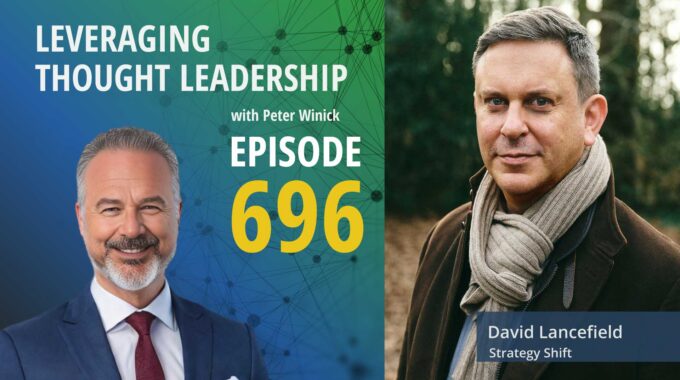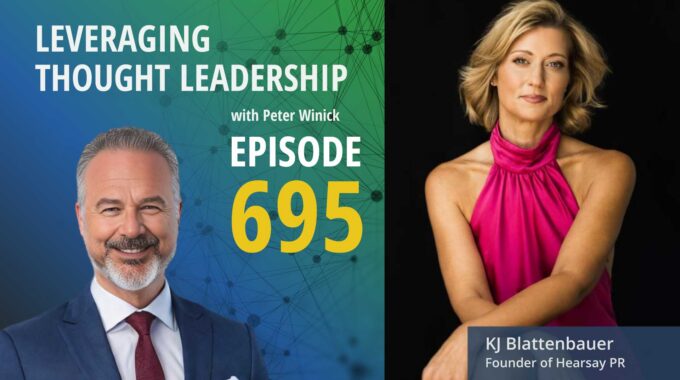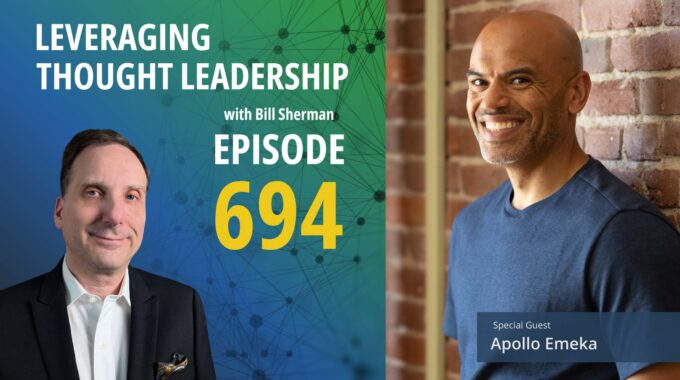Frameworks for connection, accountability, and performance This episode examines how psychological safety drives performance, how…
Beyond Retirement: Building a Legacy of Generous Leadership | Joe Davis
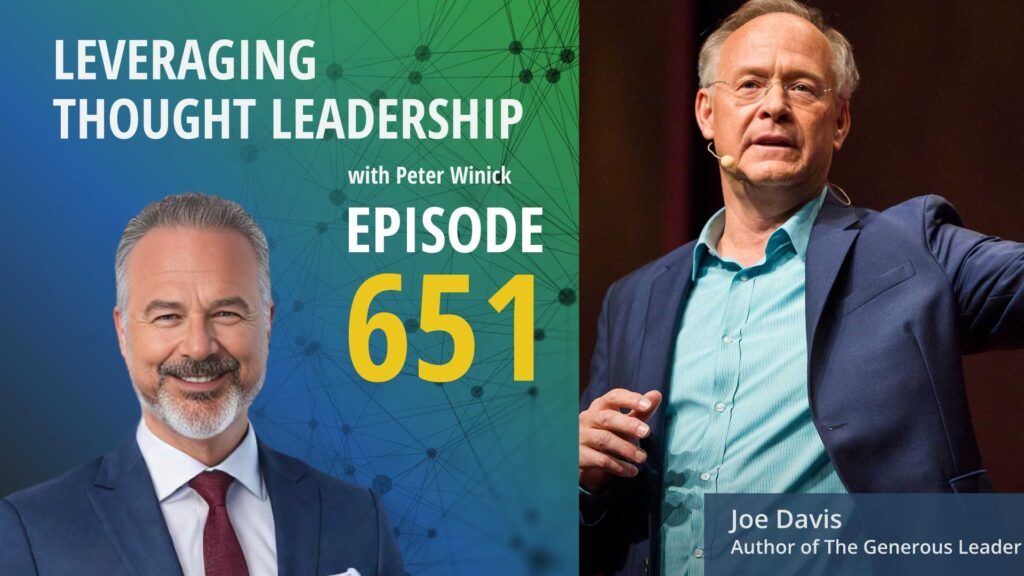
Embracing generosity and empathy as a thought leader’s most powerful tools.
Today we explore how senior executives can intentionally transition from corporate leadership to impactful thought leadership roles. Key topics include the importance of redefining success beyond traditional metrics, cultivating genuine connections, and choosing roles aligned with personal purpose to avoid burnout. The conversation also highlights the value of empathy and generosity as core components of enduring leadership legacy.
What if your greatest impact as a leader begins after your “official” career ends?
Joe Davis, former Managing Director and Senior Partner at Boston Consulting Group (BCG) and author of “The Generous Leader: 7 Ways to Give of Yourself for Everyone’s Gain”, joins Peter Winick to share insights from his extraordinary shift from consulting titan to impactful thought leader.
Joe reveals how the disruptions of COVID-19 inspired him to write his book—not just as a professional calling card, but to encourage executives to lead with heartfelt generosity and empathy. He emphasizes that legacy leadership isn’t measured by revenue alone but by meaningful connections, personal growth, and empowering others.
This episode is for CEOs and senior leaders contemplating their own “Act Three.” Joe discusses the challenges and opportunities when transitioning from a structured corporate role into thought leadership and advisory work. He highlights the importance of being selective and intentional about the roles you choose post-retirement, avoiding burnout, and keeping control over your time.
Joe also candidly discusses how success is redefined after a corporate career. He measures impact differently now, valuing deep personal connections, mentoring opportunities, and moments spent with family—especially his grandchildren.
If you’re an executive thinking about your next meaningful chapter, listen in as Joe Davis shares hard-won wisdom and practical guidance on building your legacy beyond the boardroom.
Three Key Takeaways
Legacy Starts Now: True leadership legacy isn’t shaped by quarterly earnings or titles—it’s built through empathetic connections, generosity, and empowering others, starting today.
Choose Wisely Post-Retirement: After a high-powered career, saying “yes” to everything can quickly lead to burnout. Be selective; prioritize roles that align deeply with your purpose.
Redefine Success on Your Terms: Success beyond the C-suite isn’t measured by traditional metrics. Meaningful impact emerges from mentoring, family time, and genuinely fulfilling activities.
If Joe Davis’s insights on moving from executive roles to impactful thought leadership resonated with you, check out our episode featuring Vaughn Sigmon. Vaughn shares how he successfully transitioned from corporate leadership at CarMax to launching his own thriving leadership development firm. Both episodes explore how intentionality, authenticity, and clear personal branding drive meaningful post-corporate careers.
Transcript
Peter Winick And welcome, welcome, this is Peter Winick. I’m the founder and CEO at Thought Leadership Leverage and you’re joining us on our podcast today, which is Leveraging Thought Leadership. Today my guest is Joe Davis. He’s an award-winning author and speaker on a mission to bring generosity to leadership. From 1987 to 2025, he was at Boston Consulting Group, BCG, where he served as managing director and senior partner. Joe led BCG North American, founded its Center for Inclusion and Equity. He’s got a book, which is called The Generous Leader, and offers a seven part guide to heartfelt and collaborative actions that transform the reader into a generous leader. So without further ado, how did this happen? So one, stellar career at BCJ, and now, you know, in the good old days, you would have been off playing shuffleboard and they would have given you a watch and said, good luck, Joe, right? But you established yourself as a thought leader, right, So how did… When did that happen? How did that happened? And now it’s, how is it different now post BCG life?
Joe Davis Well, that’s a second half of that question. It’s a very rich question in my stage in life. Well, the first time, you know, it’s, you’re right. Cause my gosh, 35 years of BCG starting running offices, opening businesses, running North America. You’d think I’d be on the golf course about during COVID, actually it was during COVID when it was a great time, if you were a leader with some empathy and all that, able to listen and connect, it was a great tie to be a leader, obviously, because everybody was. Uncertain, et cetera.
Peter Winick Hold on a second. I don’t know if I’ve ever heard anybody say it was a great time to be a leader during COVID.
Joe Davis I said, if you’re one who led with empathy, able to connect with your people and a good listener, because those, you know, we’ve limited 96%. Okay. Oh, well, whatever. But those, yeah, I guess the famous videos are like Arnie Sorensen, the Marriott CEO who was giving a talk to his employees about, I’m not sure when we’ll open while he’s dying of cancer and he’s balled from it, you don’t, those are the moments they shown at that time. But anyway, following that people, a friend of mine to be, so you said you should write a book. That, you know, that leadership experience kind of like breathe. I started the book, a lot of COVID in it, shared it with one publisher. The editor said, no-go. So what do you mean? It goes, nobody will want to read about a COVID, the COVID times. I mean, unless you write it right now and it publishes this minute. And it takes them two years to publish a book, as you know. Right. Right. So I expanded it across more of my life and I interviewed a lot of clients, well, CEO executives at BC, I knew through BCG, who I considered ones who lead. The way I’ve described it. I wrote this book. When I was writing it, I also, it was funny, I said to a friend, I said, I don’t know, Brandy Brown’s got a million copies and so-and-so. What the heck am I gonna be? Another guy. He said, Joe, if you move eight people to maybe change their leadership style a bit, it’ll be successful. Now, the other reason I did do this is maybe you’re not, surely you’re not there yet, but you start to think about, okay, what is the next thing? And if you don’t start to set up the next, like, what’s my post PCG life? Which could be golfing.
Peter Winick Minute, because I’ve been fortunate to work with what I call sort of these. Legacy executives, right? So these folks that have had stellar careers and most, as you say, would play golf or travel the world or get the fancy toys and all that sort of stuff. But one of the things, not the thing, but one of the primary things they want to do in that next phase when they don’t have the operational responsibility in the board meetings and jumping on, you know, three planes a month to, to Asian, all that stuff. What really drives them? Cause you’re at a stage where you can do anything you want and anything might be nothing or buy a vineyard or whatever the hell it is, but this is something that is so authentic that you’re so passionate about that you spending your most valuable resources, which is your time at this stage in life, in essence, evangelizing this way of thinking, right? So I I’ve worked with lots of CEOs, not enough. There are more and more that that are sort of thinking about it. And when the ideas start to happen is at the dinner where they’re all roasting you or whatever the case is, but probably two years before, maybe three years where you start to. So tell me about that. Like, when did it start to, well, an idea that said, maybe this will be what I’ll do.
Joe Davis Yeah, I mean, I was fortunate. There’s a program at BCG called Act Three. We, it’s a coach, you know, and he 50 to 55 year olds, they’re, which there’s not many that many of BCG think about what would be your act, your next act. And they really, they, this fellow encourages you to think, okay, you know, to start thinking that through. So it sort of began then, but I’m also shouldn’t say no dummy. I’ve read enough books like, okay. What is the next thing? And just sitting around, all you start to do is die. Oh, I say that, but that’s, you Thank you very much. I’ll see you next time. Down, deteriorate, you die. So, so you could see to your point. And you also think about what it was my purpose. What is your purpose? And I, I mean, it’s not funny, but to me, it was okay. Really help others to grow and thrive at their full potential. That’s what I like best at BCG. When people ask me, what do you remember most? I can say name clients. I can name businesses that, you know, took off or turned around. But the people who said, you know, Joe, you said this to me and that just changed my trajectory. That yeah, you’re smiling. Yeah, you think that?
Peter Winick That was good, Joe. Right. It started, yes, why do you say that? Because you’re not, you should have gone backwards in time thinking about that. When you’re in your 30s or 40s, whatever, most would say, oh, is that quarter I got the million dollar bonus, or the first time I got The Big Office, or the. Whatever the accouterments and, or I really, really, you know, I’ve turned that company around and that’s a brand that you wouldn’t like something like that. It’s none of that. Not that none of matters. It does. Right. But it’s getting connecting on a one-on-one level and getting someone to light up and say, I see you. I hear you. I get you.
Joe Davis Well, yeah, and I’ll tell you, I think Peter, most of none of that does matter. I mean, let’s be honest. Steven jobs will be remembered for the phone, but I read somewhere. Will he be remembered 4,000 years from now? The who knows what, but you know, proctor and gamblers, you don’t know their name, but they found it, but there’s like, I mean Jack Welch is remembered for GE falling apart. I mean no offense to Jack Welcher, but he was good, but there aren’t many that are remembered for all that stuff, you know? And you’re going to read. I read, well, I read just was reading strength to strength. You know, the Brooks book. And it’s a little funny, but he said, you know, you shouldn’t be collecting those things. You should be thinking about what is your eulogy going to be, even at 30? What do you want? Now that’s possible for a 30-year-old to think like that. What do want someone to say? Not even your retirement dinner, because you’re there. So it’s all bullshit, you know, they’re all going to tell you you’re wonderful. What do you want the world to say about you? You will not talk about the third Ferrari or even the great trip you had around the world that was very meaningful and exciting, but that’s cause that’s for you. It’s not for anybody else.
Peter Winick If you’re enjoying this episode of Leveraging Thought Leadership, please make sure to subscribe. If you’d like to help spread the word about our podcast, please leave a five-star review at ratethispodcast.com/LTL and share it with your friends. We’re available on Apple Podcasts and on all major listening apps, as well as at thoughtleadershipleverage.com/podcast.
Peter Winick So what does it look like now? My life. And the reason, uh, I’m asking is I think there are a lot of senior exact CEOs, leaders in their fifties or sixties or whatever it is. And they’re thinking, yeah, that would be kind of a cool next chapter. But what does that look like? Cause I know now what it looks like. I know I’ve got my strategic planning meeting in the fall and the, this tour and the like, I know the stuff and the rhythm. But jeez, what time do I wake up? What do I do? What does it look like?
Joe Davis Well, that’s, you know, I mean, let me just say, if you’re really going to try to give back, help others, you don’t teach and all that. What it looks like will vary for you. I mean I’m discovering more and more, you know, something I sent a note to a friend of mine. Hey, would you coach a guy at PCG, would you coach me? I said, sure. Let’s book once a month for an hour and we’ll cancel a third of them because you’ll be busy, not me.
Peter Winick Thank you.
Joe Davis For me, it’s, you know, actually people reach out or you reach out to them. Would you want to be coached? That’s the most satisfying because some of the really wants you. I, I mean, I wrote the book partly, let’s be honest, books are calling cards to do things like podcasts, talk, you know, talk to groups where I commit.
Peter Winick But stay there a minute with the book, because I would argue that, yes, a book is a calling card and a book also is a forcing mechanism to get you to get your ideas. Yes, there’s a lot of good things. Yeah. So there’s lot of selfish reasons to write a book, whether anybody ever reads it, right, get your thinking tight and all that other sort of stuff. But I would argued based on your personal career, BCG, et cetera, you wouldn’t have problem being busy if you didn’t have a book. That’s the second half. Okay.
Joe Davis The other thing, yes, I vote now. I’m actually board interviews to be on boards. I just had the first small startup want me to be a strategic advisor. So that kind of stuff, but either you make all that happen earlier. It starts once you say you’re retired, because then they believe you have time. No one believes you have until the day you’re out.
Peter Winick Yeah, yeah, yeah
Joe Davis Right. And the calls start coming and that’s where you have to be careful. I had a board member friend 30 years ago. He’s the board of a client. He said, you know, I’ve worked hard when I was working, but it’s worse now because I’m on nine boards. My wife’s furious because he had no control. You know, if you are the CEO, you might work all the time, but you have control. I am going to go home right now. See you all later. You can’t do that if you’re on nine board. That’s the thing you have to be careful about your point of the question. Cause you could fill yourself. Oh, this will be cool to be an advisor here, board member there, help this company and coach seven people. And then when you have wake up at seven o’clock, I will tell you, you’re pissed, wait a minute, I am now supposed to be able to wake up whenever I want, it could be six o’ clock today. It could be nine on that nine. That’s hard, but whatever it is for you. So you do really need to think hard and not everyone said to me, now we’re getting happy, do not take the first thing that comes along. Do not take it. Do now. Maybe it’s the most incredible thing in the world. You gotta think about it. But do not take it, because other things will come and you’ll put yourself in whatever.
Peter Winick But I’ve seen two different categories, if you will. And it’s not like I’ve worked with hundreds of seals, but enough could be able to sort of have an understanding. So one category says yes to everything. And to your point, you know, they wake up six months later and they’re like, geez, I’m on five boards and doing this and I’m teaching at the university. I’m like, ah, this, this is, this has hectic. They lost the control. And then there’s the other ones and what I’m thinking of in particular that, that would say they’re complete and other failures and retirees where that quote retirement period might last in one case, it was a weekend, another at six months. And they dive back in and take another similar role, or maybe they go to a startup if they were to fortune 1000 or whatever, it seems like you’ve. Stuck to the plan to some degree. You’re not tempted to go back in the deep end.
Joe Davis Well, yeah, I know. And I was, I talked to a search room guy in like September. What are you quitting for? I said, I’m 67. He said, Joe, you got more energy coming to this zoom than most people. You could, I said well, come on buddy. I can’t, Oh, no, no. People would love you as a five year, five year short term. So I was intrigued, but I thought, wait a minute. That’s not what I want to go back into 37 years of BCG. I don’t need to go to that. But I will say to your point, you know, some people that my brother-in-law and another very good friend of mine, this oldest friend. His wife’s actually now the head of North America. He was on his third CEO gig, and I said, what are you doing? He said, well, you know, Joe, I’m just not ready to get out of the game. And he’s not that old, but so if you’re not ready to get outta the game, stay in the game for a while longer. You know, if that’s what’s- Yeah, yeah, yeah. And no problem, if you just, oh God, I can’t, I’m useless and I’m nobody unless I’m a fancy leader. Then yeah, here, you should go get some help. Sorry, but that’s, or read every book about it in the world and-
Peter Winick and pay attention to what you’re reading. So let me ask you what might be a silly question. As a CEO, at some level, it’s really easy to measure success. Did we hit our goals this quarter? Did our stock price go up? Did our revenue go up, did our sales go up. There’s maybe six, eight, 10 numbers that matter at the end of the day. So at one level, although it’s not easy to achieve those goals, what they are is fairly straightforward. What is it now? How do you measure success, man?
Joe Davis It’s funny you asked, it’s very complicated. So it’s funny that you asked that, because I said, okay, I’m in this books now, you’re in, it still selling. I thought, oh, should I have a goal for the book still? And I said I want to give talks. So should I a goal for how many talks I should give this year? We’re writing this shit down. I wrote it down and I thought it doesn’t really matter. That’s not the stage of life I’m. Exactly. But I, now this is where it’s, what I have to know is am I getting up? It’s really difficult what you’ve asked, Peter. I mean, am I feeling good about what I’m doing? To me, I think, and am I actually slowing down and not feel like I’ve deteriorated? Because I was go, go, Go, go. I mean I’ll tell you, one thing I’m measuring, not measuring, but I have a five-year-old grandson, I have eight grandchildren, but he’s just so close to me right now. How many times did he just sit right there and cuddle with a five-year-old boy, cuddling? I don’t count that, but when that happens, like, ah, today was a good day. Now that was a, you know, that’s, when you get to that splice, So now if you need to work and want to work. It’s okay, but not if you’re gone 24 hours a day, you know We’ve all heard the good friend of mine Art Peck BCG was the head at Gap
Peter Winick Yep.
Joe Davis You’re not playing with somebody and the guy was talk while they’re talking. They’re both working hard is I’d be 62 of the time He said, you don’t my wife said to me something yesterday. She said you know, Hey honey, you have 17 summers left How are you spotting summers? Well, I got well, you no if you think about it You think that way. No, is this what I want to do this Christmas? Is this what? Going to do this summer. Now, but this is really hard for…
Peter Winick Well that would make me nervous because what if you get to your 18th and 19th summer and your wife says well you’re in extra innings now we’re going to have no it’s only counting on 17.
Joe Davis Well, I don’t know how good the marriage was. What’s the person next star? It wasn’t art. But the way the point, of course, is, you know, you’ve got now you have this, you know, there you had forever time. When you’re 30, you got all the time in the world and less fluke.
Peter Winick But that shift in mindset, right? That shift, that’s hard, right, because you don’t get to the positions you’ve gotten to at BCG by not having a plan, by not being able to execute, by not being.
Joe Davis And I, yeah, no, I mean, I was, well, two things. Yes. And I was lucky that I had the book because the book just opened. I can be on podcasts. I can give talks. So at least I, if I need to feel like, Oh, someone thinks I’m important. Now I’ve started to shift it. You know, I had a bit of a plan, but yeah, it can be a major mindset. Mindset shift. I had BCG does something else. It doesn’t matter what the two years bridge path you say in two years, I’m quitting and you guys have 5% then 50%. It is a gift. I mean, if you’re a CEO and want to give a gift to your fellow executives that are 55 plus, give them some version of a ramp out. Cause that’s…
Peter Winick Let me make sure I understand. So it’s not binary that’s, you know, Friday is your last day and Monday you go to zero. So you go from 100% exact to 75, that’s brilliant.
Joe Davis Now, yes, it’s brilliant, right? It’s brilliant. And so really, at 75%, you’re still, well, the way BCG does it, you have to still generate revenue. The 50% year, you don’t generate revenue, so you’re kind of not doing.
Peter Winick Wait, did you say a consulting firm and you don’t generate revenue in the same sentence? So I’m like, yeah, well, but sure, you got to be.
Joe Davis But sure you’ve got be around 25 years, and in good standing, all this. Yeah, yeah, yeah. However, that I can pay tribute a lot of the smooth ramp to that ramp instead of spending another friend that said to me, Oh, Joe, be careful because he just quit, he said six months, you’ll do your honey do list, your own honey do this, not be able to, and you’re out of things on the list. And he said, no, what am I going to do? Everything’s done.
Peter Winick How many times did you clean out the garage?
Joe Davis Right. That’s exactly the, that closet that drove you nuts forever. So yeah, I quickly realized that the closet be full of really doesn’t just doesn’t fucking matter. I shouldn’t swear. Doesn’t bloody matter. It’s just a closet.
Peter Winick I love it. It’s been great. I appreciate your candor and transparency. And I think there’s a, there’s a lot of wisdom here, right?
Joe Davis Rapid fire was over 20 minutes, but it’s uh.
Peter Winick Yeah, no, and I think most importantly, you’re having a blast. You’re having fun. You’re doing good stuff. You’re teaching people things. And I would argue if, if you didn’t like it, you’d say, I’m out of here. I’m going to go.
Joe Davis Figure something else out. So like, of course, yeah, actually, that’s the big people should take away that too. If you jump into something, I know, I’m like, I like doing this. Do not do it. Go do the next thing. Somebody will want you to help out somewhere, you know.
Peter Winick Well, I appreciate it, Joe. Thank you for coming on. Thank you. This is awesome.
Peter Winick To learn more about Thought Leadership Leverage, please visit our website at ThoughtLeadershipLeverage.com. To reach me directly, feel free to email me at peter at Thought Leadership leverage.com and please subscribe to Leveraging Thought Leadership on iTunes or your favorite podcast app to get your weekly episode automatically.


